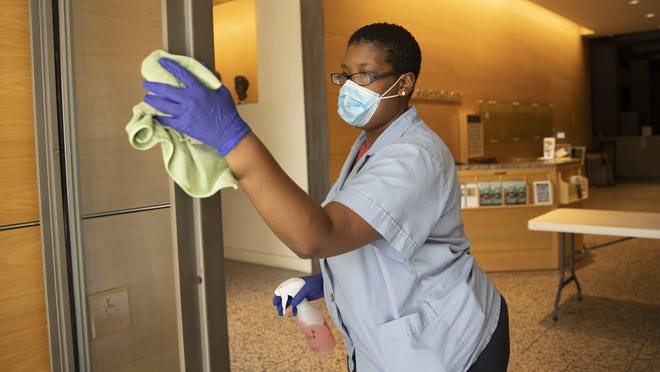
Cleaning the University of Texas is a monumental task in a normal year.
While students and alumni fondly refer to the campus as the Forty Acres, a nod to the original plot of land, the current Austin campus spreads across about 430 acres, and keeping it clean requires a small army.
“It’s a huge, huge endeavor,” said Richard Charbel, building services supervisor in Custodial Services. Charbel oversees hundreds of custodians who clean the 16.5 million square feet at the university — the equivalent of about 300 White Houses.
Later this month, Charbel and his staff will be put to the test as students and faculty return to campus for the fall semester amid the ongoing coronavirus pandemic. Although only about 40% of courses will physically return to classrooms, preventing the spread of the coronavirus is a top priority that has required months of preparation — including rethinking classroom layouts, course schedules and basic human behavior.
“I think mentally of course, just like anyone else, people have concerns,” Charbel said. “But in our case that’s a good thing. My fear would be someone who does not have any concerns at all, because that would drive some unsafe behavior.”
Over the summer, UT leaders have been drafting plans to keep faculty, staff and students safe when classes resume Aug. 26. Classroom capacities will be limited to 40%; all students, employees and guests are required to wear face coverings; and students have been asked to self-quarantine two weeks before arriving on campus.
But much of the responsibility will fall to the 450 custodians who clean hundreds of buildings every day.
“They really understand that we're here on a mission,” Charbel said of his staff. “And our mission is to provide a clean and safe area for the entire campus community.”
Custodians are focused on regularly cleaning high-touch areas, such as door knobs, arm rests, stair rails, light switches and elevator buttons. Signs will be placed on walls and floors to remind people to keep six feet apart. While the university hasn’t hired any additional staff to clean buildings, it has purchased additional cleaning supplies, including electrostatic sprayers to disinfect classrooms, 500 new trashcans for people to throw away paper towels outside restrooms, and more than 3,000 gallons of hand sanitizer.
According to UT Facilities Services, custodial staff will disinfect high-use public touch points in the main campus twice a week. High-use touch points at the Dell Medical School and University Health Services will be disinfected daily, as well as keyboards and touch panels at the front of classrooms.
Occupants of personal spaces, like offices and cubicles, are responsible for disinfecting their space and also for disinfecting shared office equipment such as copiers, fax machines, refrigerator door handles, coffee makers and vending machines.
Although most campus activity has been suspended since March, some research labs and graduate students have continued to work on campus, and Charbel said it’s become second nature for custodians to wear masks and practice safety protocols while cleaning.
“We want to be the example for when people first come to campus,” he said.
Still, the pandemic has not been easy on UT’s custodial staff. Earlier this year, the university reported an outbreak among 11 staffers. A month later, a custodial manager who had tested positive died.
Charbel worked directed with the manager, whose name has not been released by the university. He was a very dedicated, professional employee, Charbel said, and his death has been hard on many of his colleagues.
“Sometimes tragedies, they bring people together,” he said. “As a team, we have responded with positivity, as he would have wanted us to.”
If an outbreak of coronavirus does occur on campus, custodial services will be notified via the emergency department. The university’s Occupational Health Program is in charge of monitoring employees who have tested positive or are presumed positive with the coronavirus. The program will contact the employee’s managers to identify any close contacts and work with the Environmental Health and Safety Department to close off or deep clean any necessary areas.
In the meantime, Charbel said the university has been taking input from the custodians who are on the ground and see things they may not. While the custodial department’s mantra has always been “safety, safety, safety,” he said they are excited to get people back on campus.
“A lot of my custodians, they say they miss the students, they miss the faculty, they miss the support,” Charbel said. “It's kind of weird to be on campus and not see literally thousands of people.”
